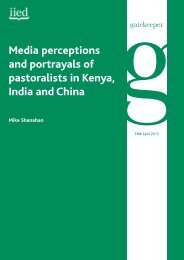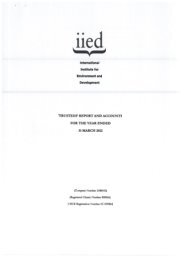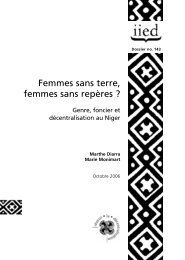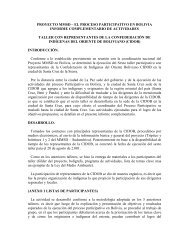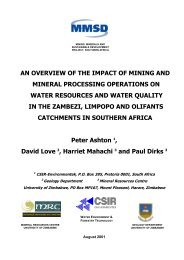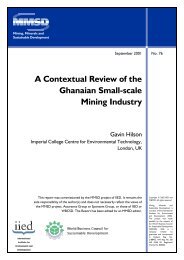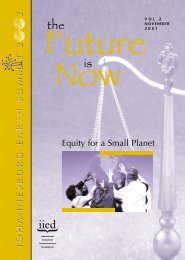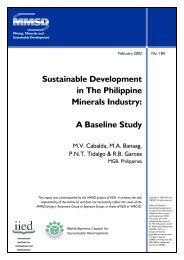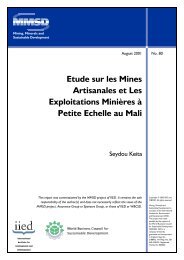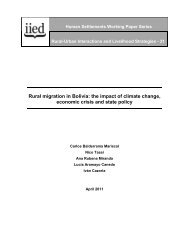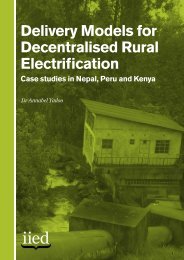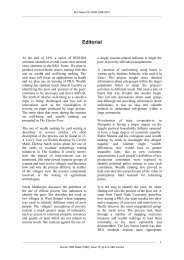Developing pro-poor markets for environmental services in the ...
Developing pro-poor markets for environmental services in the ...
Developing pro-poor markets for environmental services in the ...
Create successful ePaper yourself
Turn your PDF publications into a flip-book with our unique Google optimized e-Paper software.
Results of <strong>the</strong> survey of 100 respondents from <strong>the</strong> five barangays showed that <strong>the</strong> majority<br />
found <strong>the</strong> water-system <strong>pro</strong>jects very helpful <strong>in</strong> <strong>pro</strong>vid<strong>in</strong>g direct access to potable water, as<br />
well as water <strong>for</strong> garden<strong>in</strong>g and animal <strong>pro</strong>duction, and reduction of water-borne diseases.<br />
An overwhelm<strong>in</strong>g number showed great appreciation <strong>for</strong> <strong>the</strong> solid-waste management<br />
<strong>pro</strong>jects because of <strong>the</strong> im<strong>pro</strong>vement <strong>in</strong> sanitation. The dump trucks likewise served as<br />
vehicles <strong>for</strong> relocat<strong>in</strong>g victims dur<strong>in</strong>g times of calamities, and <strong>for</strong> construction and repair of<br />
<strong>in</strong>frastructure <strong>pro</strong>jects. Hence, <strong>the</strong>re were positive results experienced from such <strong>pro</strong>jects.<br />
F<strong>in</strong>ally, <strong>the</strong> health centres were beneficial not only <strong>in</strong> terms of serv<strong>in</strong>g as a venue <strong>for</strong> cur<strong>in</strong>g<br />
<strong>the</strong> sick, but also as venues <strong>for</strong> im<strong>pro</strong>v<strong>in</strong>g family health care <strong>in</strong> general.<br />
In general, <strong>the</strong> RWMHEEF and DLF <strong>pro</strong>grammes of <strong>the</strong> DOE were deemed helpful by <strong>the</strong><br />
beneficiaries <strong>the</strong>mselves <strong>in</strong> terms of <strong>pro</strong>vid<strong>in</strong>g basic needs and im<strong>pro</strong>v<strong>in</strong>g <strong>the</strong>ir standards of<br />
liv<strong>in</strong>g. However, <strong>the</strong> study believes that <strong>the</strong> benefits could be maximised if more people are<br />
made aware of <strong>the</strong> existence of such <strong>pro</strong>jects, and if government agencies were more<br />
coord<strong>in</strong>ated <strong>in</strong> <strong>the</strong>ir ef<strong>for</strong>ts to spread <strong>the</strong> benefits throughout <strong>the</strong> widest range of beneficiaries<br />
possible. Monitor<strong>in</strong>g plays an important role, and although <strong>the</strong> MOAs <strong>pro</strong>vide <strong>for</strong> LGUs and<br />
<strong>the</strong> NPC to undertake monitor<strong>in</strong>g activities, compliance has been very <strong>poor</strong> so far.<br />
4.2.8 Conclusion<br />
The NPC case is illustrative of how <strong>markets</strong> <strong>for</strong> watershed <strong>services</strong> are be<strong>in</strong>g <strong>in</strong>troduced <strong>in</strong><br />
<strong>the</strong> country, whereby <strong>the</strong> government acts as an <strong>in</strong>termediary between <strong>the</strong> buyers, <strong>in</strong> this case<br />
<strong>the</strong> energy <strong>pro</strong>ducers, and <strong>the</strong> sellers, i.e. <strong>the</strong> communities host<strong>in</strong>g <strong>the</strong> energy <strong>pro</strong>jects.<br />
Un<strong>for</strong>tunately, <strong>the</strong>re is still a weak l<strong>in</strong>k between <strong>the</strong> ‘payment’ to <strong>the</strong> communities and<br />
watershed <strong>pro</strong>tection. The mechanism has been set up, but <strong>the</strong> <strong>in</strong>terplay of market <strong>for</strong>ces is<br />
still not as dynamic as it is hoped it would be. The fund is hardly used <strong>for</strong> watershed<strong>pro</strong>tection<br />
<strong>pro</strong>jects, ra<strong>the</strong>r basic needs are given a much higher priority. Although this has<br />
noth<strong>in</strong>g to do with <strong>the</strong> DOE’s management of <strong>the</strong> fund, it somehow reflects how<br />
<strong>environmental</strong> objectives are not yet given priority <strong>in</strong> <strong>the</strong> use of <strong>the</strong> fund. It is thus difficult to<br />
determ<strong>in</strong>e now if this particular economic <strong>in</strong>strument, <strong>in</strong> meet<strong>in</strong>g its <strong>environmental</strong><br />
objectives, entails economic and social costs to <strong>the</strong> affected communities, or if welfare is<br />
im<strong>pro</strong>ved simultaneously with conservation.<br />
Never<strong>the</strong>less, <strong>the</strong>re is reason to believe such <strong>markets</strong> will develop. Government policies are<br />
now geared towards valu<strong>in</strong>g such <strong>services</strong> and realis<strong>in</strong>g <strong>the</strong>se values <strong>for</strong> community benefits.<br />
In a very m<strong>in</strong>imal sense, <strong>the</strong> small amount of one centavo per kwh represents what can be<br />
seen as part of a nascent value of watershed-<strong>pro</strong>tection <strong>services</strong>, which is now be<strong>in</strong>g diverted<br />
back to <strong>the</strong> host communities. Direct <strong>environmental</strong> <strong>in</strong>vestment from <strong>the</strong>se power <strong>pro</strong>ducers<br />
would constitute <strong>the</strong> o<strong>the</strong>r portion of <strong>the</strong> value of watershed <strong>pro</strong>tection.<br />
Ano<strong>the</strong>r <strong>in</strong>sight drawn from this case study is <strong>the</strong> fact that <strong>environmental</strong> <strong>in</strong>vestments are<br />
difficult to come by unless basic social <strong>services</strong> of communities are met. The RWMHEEF<br />
illustrates this po<strong>in</strong>t. Although <strong>the</strong> fund allowed <strong>for</strong> environment-related <strong>pro</strong>jects, most local<br />
governments chose to <strong>in</strong>vest <strong>in</strong> basic <strong>services</strong>, such as <strong>pro</strong>vision of water-supply and healthrelated<br />
<strong>in</strong>frastructure <strong>for</strong> <strong>the</strong>ir constituents. Some government personnel may perceive this as<br />
anomalous, but political reality dictates that <strong>pro</strong>jects that are perceived to have greater impact<br />
on current generations will always be preferred over those <strong>for</strong> future generations, especially if<br />
<strong>the</strong> belief is that such <strong>pro</strong>jects will affect <strong>the</strong> quality of life of <strong>the</strong> communities <strong>in</strong> question. If<br />
host LGUs and communities can be conv<strong>in</strong>ced that <strong>in</strong>vestments <strong>in</strong> watershed-<strong>pro</strong>tection and<br />
o<strong>the</strong>r environment-related <strong>pro</strong>jects can have direct and immediate impacts on livelihood,<br />
<strong>the</strong>re might be a chance that such environment-related <strong>in</strong>vestments will <strong>in</strong>crease <strong>in</strong> <strong>the</strong> future.<br />
84



